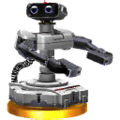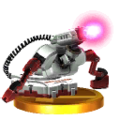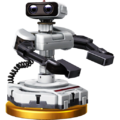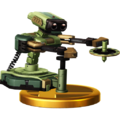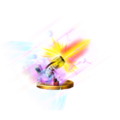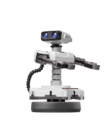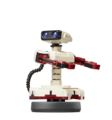R.O.B. (SSB4): Difference between revisions
(Undid edit by Diddy Kongstar: Don't. This is a western wiki, it uses the western data.) Tag: Undo |
|||
| Line 186: | Line 186: | ||
==Update history== | ==Update history== | ||
Like {{SSB4|Mario}} and {{SSB4|Pit}}, R.O.B. has received a very small number of direct changes from game updates. Update [[1.0.4]]'s changes to [[vectoring]] indirectly buffed him by enabling his Beep Boop combo ( | Like {{SSB4|Mario}} and {{SSB4|Pit}}, R.O.B. has received a very small number of direct changes from game updates. Update [[1.0.4]]'s changes to [[vectoring]] indirectly buffed him by enabling his Beep Boop combo (up throw → up aerial) to function past low percentages, and even as a KO combo. However, update [[1.0.6]] notably decreased the knockback of R.O.B.'s up throw. This hindered its KO potential to the point that it now KOs roughly 20% later; previously, it was the strongest up throw in the game, and the second strongest throw of any kind after {{SSB4|Ness}}' [[Ness (SSB4)/Back throw|back throw]]. | ||
Despite this, up throw remains a viable KOing option, especially on [[platform]]s. Its lower knockback has also granted it combo potential at low percentages; when coupled with its launching angle, its combos are also more varied and less susceptible to [[directional influence]] compared to down throw's. As a result, up throw can now be used to conserve the [[fresh]]ness of both down throw and up aerial for later combo and KO attempts, respectively. | Despite this, up throw remains a viable KOing option, especially on [[platform]]s. Its lower knockback has also granted it combo potential at low percentages; when coupled with its launching angle, its combos are also more varied and less susceptible to [[directional influence]] compared to down throw's. As a result, up throw can now be used to conserve the [[fresh]]ness of both down throw and up aerial for later combo and KO attempts, respectively. | ||
| Line 198: | Line 198: | ||
'''{{GameIcon|ssb4}} [[1.0.6]]''' | '''{{GameIcon|ssb4}} [[1.0.6]]''' | ||
*{{ | *{{nerf|Up throw's knockback decreased|70 (base)/72 (growth)|60/70. While this grants it combo potential at low percentages, this more significantly hinders its KO potential.}} | ||
'''{{GameIcon|ssb4}} [[1.1.4]]''' | '''{{GameIcon|ssb4}} [[1.1.4]]''' | ||
Revision as of 00:56, March 1, 2020
| R.O.B. in Super Smash Bros. 4 | |
|---|---|
{{{content1}}}
{{{content2}}} 
| |
| Universe | R.O.B. |
| Other playable appearances | in Brawl in Ultimate |
| Availability | Unlockable |
| Final Smash | Super Diffusion Beam |
| Tier | D (36) |
R.O.B. (ロボット, Robot) is a playable character in Super Smash Bros. 4. After initially being leaked on August 19th, 2014 as part of the ESRB leak, his return to the series was officially announced on SSB4's official website on October 9th, 2014, during which Ganondorf was also announced.[1]
R.O.B. is ranked 36th out of 55 on the tier list, placing him in the D tier. This is a moderate drop from his placement in Brawl, where he was ranked 18th out of 38. R.O.B.'s boasts a strong zoning game and recovery: Robo Beam and Gyro are chargeable, long-ranged projectiles, while Robo Burner is versatile; covers impressive overall distance; and is complimented by his much faster air speed.
R.O.B. also possesses a strong air game, thanks to all but one of his aerials having disjointed hitboxes, alongside a capable grab game. Despite being a heavyweight, R.O.B.'s overall mobility is also respectable. Notably, R.O.B.'s once poor KO potential has been significantly improved, thanks to receiving a number of strong KOing options.
However, R.O.B.'s ground game lacks range compared to his air game. This is most obvious with his arm-based attacks, especially in regard to his overall grab range, which is now the shortest ranged in the game. While it is still strong, R.O.B.'s zoning game has also been somewhat toned down, as Robo Beam is slower and Gyro deals significantly less damage. R.O.B. is also susceptible to combos because of his heavy weight and large hurtbox. Lastly, his newfound KOing options are hindered by noticeable amounts of start-up lag.
Overall, R.O.B. is a more powerful character compared to the previous game, thanks to him largely retaining his strengths and having noticeably improved KO potential; yet, the larger competition present and many of the tools the new characters possess harm R.O.B more than they did in Brawl, thus resulting in his lower tier position relative to the cast. As such, he has achieved overall average tournament results, and has gained a number of dedicated players to his credit.
How to unlock
Super Smash Bros. for Nintendo 3DS
- Play 70 VS Matches.
- Collect 200 unique trophies.
After completing one of the two methods, R.O.B. must then be defeated on PictoChat 2.
Super Smash Bros. for Wii U
- Play 60 VS Matches.
- Play through 10 rounds of Crazy Orders and defeat Crazy Hand.
After completing one of the two methods, R.O.B. must then be defeated on Wrecking Crew.
Attributes
R.O.B. is the tenth heaviest character in the game, yet he possesses respectable overall mobility in spite of his weight class. This is thanks to his average walking and dashing speeds; above-average air, falling and fast falling speeds; slow air acceleration; high traction, jump and double jump; and low gravity. Altogether, these attributes allow R.O.B. to outmaneuver some of his fellow heavyweights; make him almost as mobile as a middleweight; and grant him better jumping prowess than most characters of either weight class.
Like in Brawl, R.O.B. is a zoning-oriented character with very useful projectiles to keep his opponents at bay. Robo Beam enables him to attack from considerable distance, and becomes the noticeably stronger Super Robo Beam when it is left idle for 14.3 seconds. While Robo Beam interrupts opponents faster, Super Robo Beam deals more damage and has higher knockback growth. Gyro is an auto-chargeable projectile that becomes an item when fired. Compared to Robo Beam, it has a more favorable angle for disrupting opponents, while also being more manipulable as a projectile and having greater KOing potential. Thanks to R.O.B.'s item throws being among the strongest in the game, Gyro is also very useful when smash thrown as an item.
Aside from his offensive prowess with projectiles, R.O.B. also does not have issues against projectiles, courtesy of Arm Rotor's ability to reflect them with greater strength than they initially had. In addition to its reflection ability, Arm Rotor now boasts KO potential, thanks to its finishing hit having significantly higher knockback growth.
R.O.B.'s air game is also strong, thanks to the excellent and disjointed ranges of all but one of his aerials. Neutral aerial has large, disjointed hitboxes that make it a reliable combo starter at low to medium percentages when SHFF'd, as well as a useful spacing option. Up aerial is one of R.O.B.'s best moves overall, thanks to its usefulness in harassing airborne opponents by either juggling or KOing them. Back and down aerials are R.O.B.'s most damaging aerials when sweetspotted, and have large hitboxes like neutral aerial. However, they also boast specific strengths: the former has recovery potential thanks to it propelling R.O.B. forward slightly, whereas the latter is a meteor smash. Lastly, forward aerial is arguably R.O.B.'s least useful aerial because of its hitbox having much shorter range and not being disjointed. However, it is R.O.B.'s fastest aerial, which makes it reliable for spacing, especially when SHFF'd, as well as edge-guarding.
Unlike in Brawl, R.O.B. now boasts respectable KO potential. Like his up aerial, back aerial, up throw and Arm Rotor, R.O.B.'s smash attacks now boast KO potential, thanks to being buffed in various ways. Forward smash's sweetspot deals slightly more damage and higher knockback. Although forward smash's other hitboxes deal less damage, they have been re-positioned farther outward, which improves its range. Up smash's sweetspot and down smash also deal more damage and, like forward smash, have had their hitboxes tweaked for the better: up smash now has hitboxes on R.O.B.'s arms that launch the opponent into its thruster hitboxes, whereas down smash is now a semi-spike.
R.O.B.'s grab game has also improved. Forward and back throws are still limited in regard to utility, but are nevertheless decent for spacing and setting up edge-guards. In comparison, R.O.B.'s up and down throws are much more useful. Up throw is his most damaging throw; a viable KOing option, especially when boosted by rage; and can even be used for combos at low percentages. In comparison, down throw deals respectable damage, and is a reliable combo starter into his up aerial from 0% to medium percentages.
Although R.O.B. possesses a number of useful traits, he also has some noteworthy shortcomings. Despite his KO potential's drastic improvements, landing his KOing options can still be problematic because of them being laggy and/or having unimpressive ranges. The latter trait is particularly noticeable in regard to R.O.B.'s arm-based attacks, most of which have hitboxes that have either become smaller and/or tweaked for the worse. For example, his grab game is hindered by his overall grab range now being the shortest in the game because of his much smaller grabboxes, whereas his up tilt has drastically less utility because of its adjusted hitboxes.
In addition to R.O.B.'s hitbox issues, his hurtbox also hinders him, as it has become larger since Brawl. When coupled with his faster falling speed, he is much more susceptible to combo-oriented characters, such as Luigi and Zero Suit Samus. This is further compounded by his aerials' inability to reliably break combos: neutral and down aerials are too slow, forward and up aerials only hit in front of and above R.O.B., respectively, and back aerial has both slow start-up and only hits behind him.
While R.O.B.'s zoning game remains his greatest strength, the universal nerf to projectile camping has somewhat toned it down. Gyro, in particular, has been the most adversely affected of his projectiles: in addition to retaining its susceptibility to being stolen, a fired Gyro deals drastically less damage and covers less range. The removal of glide tossing also significantly hinders its approach potential. Robo Beam's nerfs are not as severe in comparison, but are nevertheless noticeable: it now deals slightly less damage, and both it and Super Robo Beam travel slower. As a a result of these nerfs, R.O.B. now has a more difficult time dealing with most characters that have better projectiles (such as Sheik and Diddy Kong); attacks that counteract his own projectiles (such as Fox and Falco); or both (such as Villager).
R.O.B.'s custom moves can alleviate many of his weaknesses. Wide Angle Beam, true to its name, can be aimed in a much wider arc, which enables R.O.B. to catch aerial opponents easily. However, it deals slightly less damage. Infinite Robo Beam, also true to its name, can be shot infinitely. This allows R.O.B. to use his zoning game constantly and defend himself. However, it also deals less damage, cannot ricochet, and Super Robo Beam needs to charge for longer. Reflector Arm acts like a traditional reflector, having a higher reflection multiplier and longer duration. However, R.O.B. will not move when using it, preventing him from pressuring the opponent.
Backward Arm Rotor has a shorter duration, but is a very effective defensive option, as it moves R.O.B. backward, and comes out much faster (contrary to what its description suggests). High-Speed Burner has less fuel, but allows R.O.B. to recover more easily due to its increased aerial movement. Robo Rocket functions like a traditional recovery move, launching R.O.B. upwards, and can even meteor smash. However, it cannot be used in bursts; covers less horizontal distance; and its meteor smash is weak. Fire Gyro deals more damage, but covers less distance when fired. Slip Gyro slides across the stage, making it more predictable, but trips opponents when the Gyro hits them, giving R.O.B. access to many follow-ups.
Overall, R.O.B. is a defensive character that still possesses a strong zoning game, but now wields improved close-range offense. While R.O.B. now has to use close quarters combat more frequently because of his playstyle now being less reliant on his projectiles, he can now effectively KO opponents without having to rack up an outstanding amount of damage. As a result, he has become a more potent character than he was in Brawl and has some dedicated and noteworthy mains to his credit, such as Holy, Mister Eric and 8BitMan.
Changes from Super Smash Bros. Brawl
R.O.B. has received both buffs and nerfs in the transition from Brawl to SSB4 but was considerably nerfed overall. The most prominent buff was to his KO potential; many of his KOing options in Brawl have become more powerful and/or slightly easier to land, while other moves have been strengthened to the point of possessing KO potential, such as his up aerial and down smash. R.O.B. has also seen some benefits from the changes to Smash 4's mechanics as the weakening of SDI improves the reliability of his multi-hit moves and the changes to hitstun canceling and DI have improved his combo potential. R.O.B. also benefits from the introduction of rage as it further improves his KO power and his solid recovery and heavy weight allow him to build up a high amount of rage.
R.O.B. also received some significant nerfs, however. His powerful zoning game has been hampered as his projectiles have seen some noticeable downgrades. Robo Beam travels significantly slower while Gyro is much weaker when fully charged and its firing rate is slower. R.O.B. was also one of the characters who was hindered the most by the removal of glide tossing as it significantly hinders his approach with Gyros. This makes approaching more important, as R.O.B.'s camping and defensive game was significantly toned down. R.O.B. is a larger target and a fair amount of his moves have reduced range making him an even easier target to hit. To further compound this, R.O.B. is no longer a heavy floaty instead having above average falling speed and gravity. While this makes it easier for him to land, this significantly increases his vulnerability to combos and it worsens his aerial game and recovery. R.O.B.'s overall frame data has been nerfed as many of his attacks have increased startup lag, shorter durations, increased ending lag or all three. R.O.B.'s aerial game has also been toned down. R.O.B.'s short hop is significantly lower which greatly reduces his aerial output and his forward and back aerials have increased landing lag with the later also having a much worse auto-cancel window now, as well as his up and down aerials. Neutral aerial is weaker in exchange for having more combo potential, forward aerial is weaker and has increased ending lag, back aerial is drastically laggier while possessing many new sourspots, up aerial deals much less damage (although it connects more reliably and the final hit is stronger) and down aerial is weaker. While R.O.B. has greater KO power, his KO moves have seen downgrades making them harder to land as many of them are noticeably laggier and some of them mainly forward smash and back aerial now have significantly weaker sourspots making them more difficult to land. His recovery was also nerfed as while his air speed is considerably faster, Robo Burner travels slower and covers less distance while his aforementioned increased falling speed and slower back aerial further hinder his recovery.
Overall, while R.O.B.'s KO power is greater, it does not make up for his worse zoning game combined with his worse frame data, aerial game and recovery. R.O.B. is largely forced to engage in a mix of zoning and close quarters combat in order to score KOs and his worse frame data, reduced range on multiple moves, larger size and increased susceptibility to combos do not help this matter. The changes to Smash 4's mechanics also do not benefit him as much as some other characters as the changes to hitstun canceling is very much a double edged sword for him and he has seen some notably hindrances mainly from the removal of glide tossing. R.O.B. does not even benefit from having a better matchup spread as while he has an easier time against some of the characters who gave him a difficult time in Brawl such as Meta Knight, King Dedede, Falco and Olimar due to their severe nerfs, this cannot be said for the entire cast and he has a very difficult time against Cloud, and Bayonetta. As a result, R.O.B. is considerably worse than in Brawl.
Aesthetics
 R.O.B.'s design has slightly changed. His body now has a satin finish, instead of a polished finish; his gray-colored components are darker; his head is slightly smaller; and his eyes are slightly larger and have more defined lenses. Altogether, these changes make R.O.B. appear significantly more in line with his appearance as a real life video game peripheral.
R.O.B.'s design has slightly changed. His body now has a satin finish, instead of a polished finish; his gray-colored components are darker; his head is slightly smaller; and his eyes are slightly larger and have more defined lenses. Altogether, these changes make R.O.B. appear significantly more in line with his appearance as a real life video game peripheral. R.O.B. has received two new alternate costumes.
R.O.B. has received two new alternate costumes. R.O.B.'s default costume now changes depending on the language the game is set to. The Famicom color scheme (which was R.O.B.’s default costume in Brawl) is still the default in the Japanese, Chinese, or Korean versions. All other versions use his NES colors as the default instead. The non-default color scheme appears as the second costume in both cases.
R.O.B.'s default costume now changes depending on the language the game is set to. The Famicom color scheme (which was R.O.B.’s default costume in Brawl) is still the default in the Japanese, Chinese, or Korean versions. All other versions use his NES colors as the default instead. The non-default color scheme appears as the second costume in both cases. R.O.B. now faces the foreground at an angle, instead of facing directly forward. He will also always turn to the right when performing all of his taunts, regardless of whether he is facing left or right.
R.O.B. now faces the foreground at an angle, instead of facing directly forward. He will also always turn to the right when performing all of his taunts, regardless of whether he is facing left or right. R.O.B. is more expressive. He appears angry while charging his up and down smash attacks, and during his down throw and Arm Rotor. R.O.B. also appears sad when he is grabbed.
R.O.B. is more expressive. He appears angry while charging his up and down smash attacks, and during his down throw and Arm Rotor. R.O.B. also appears sad when he is grabbed.
 As of update 1.1.7, R.O.B. does not emote whatsoever in Versus Mode. However, he emotes properly in single-player modes, such as Training Mode.
As of update 1.1.7, R.O.B. does not emote whatsoever in Versus Mode. However, he emotes properly in single-player modes, such as Training Mode. R.O.B.'s mechanical sound effects are lower pitched.
R.O.B.'s mechanical sound effects are lower pitched. Arm-based attacks now emit visual trails that match R.O.B.'s selected color scheme.
Arm-based attacks now emit visual trails that match R.O.B.'s selected color scheme.
Attributes
 R.O.B. is larger. This makes his hurtbox larger. While this would also improve his overall range, this is slightly mitigated by some of his moveset having smaller hitboxes.
R.O.B. is larger. This makes his hurtbox larger. While this would also improve his overall range, this is slightly mitigated by some of his moveset having smaller hitboxes. R.O.B. walks faster (1.1 → 1.122).
R.O.B. walks faster (1.1 → 1.122). R.O.B. dashes faster (1.5 → 1.568) although he dashes slower relative to the cast.
R.O.B. dashes faster (1.5 → 1.568) although he dashes slower relative to the cast. R.O.B.'s air speed is faster (0.89 → 1.08).
R.O.B.'s air speed is faster (0.89 → 1.08). R.O.B.'s air acceleration is higher (0.046 → 0.085).
R.O.B.'s air acceleration is higher (0.046 → 0.085). R.O.B. falls significantly faster (1.2 → 1.6). This improves his vertical endurance, but makes him more susceptible to combos.
R.O.B. falls significantly faster (1.2 → 1.6). This improves his vertical endurance, but makes him more susceptible to combos. R.O.B.'s gravity is higher (0.065 → 0.09) making him less susceptible to juggling but hindering his endurance and making him more susceptible to combos.
R.O.B.'s gravity is higher (0.065 → 0.09) making him less susceptible to juggling but hindering his endurance and making him more susceptible to combos. R.O.B.'s item throw is stronger (0.9 → 1.02).
R.O.B.'s item throw is stronger (0.9 → 1.02). Rolls have a longer duration (frames 4-15 → 4-16) and less ending lag (FAF 35 → 30).
Rolls have a longer duration (frames 4-15 → 4-16) and less ending lag (FAF 35 → 30). Rolls have a new animation where R.O.B. does not move as far into the Z axis allowing his opponents to punish his rolls sooner despite their longer duration.
Rolls have a new animation where R.O.B. does not move as far into the Z axis allowing his opponents to punish his rolls sooner despite their longer duration. Air dodge has less startup (frame 4 → 3) and ending lag (FAF 40 → 33).
Air dodge has less startup (frame 4 → 3) and ending lag (FAF 40 → 33). Air dodge has a slightly shorter duration (frames 4-29 → 3-27).
Air dodge has a slightly shorter duration (frames 4-29 → 3-27). Spot dodge has more startup lag with a shorter duration (frames 2-20 → 3-17) and has more ending lag (FAF 26 → 27).
Spot dodge has more startup lag with a shorter duration (frames 2-20 → 3-17) and has more ending lag (FAF 26 → 27). Opponents gain much more height when footstooling off of R.O.B. making him much less susceptible to footstool combos.
Opponents gain much more height when footstooling off of R.O.B. making him much less susceptible to footstool combos. The changes to hitstun canceling both help and hinder R.O.B. They significantly improve his combo potential, but make him more susceptible to combos especially when combined with his significantly increased falling speed.
The changes to hitstun canceling both help and hinder R.O.B. They significantly improve his combo potential, but make him more susceptible to combos especially when combined with his significantly increased falling speed.
Ground attacks
- Neutral attack:
 The second hit of neutral attack now has consistent base knockback (40/30 → 40).
The second hit of neutral attack now has consistent base knockback (40/30 → 40). Both hits of neutral attack have a shorter duration (frames 3-6 → 3-4) and smaller hitboxes as all of their hitboxes except for the main hitboxes have been removed and their size (3u → 3.5u) and x/y/z offset (-1/0/-7 (both) → 0/10/12.5 (hit 1), 0/7.7/13 (hit 2)) were not fully compensated. This also means that the first hit always launches vertically (100°/361° → 100°) removing the near hit's ability to lock opponents.
Both hits of neutral attack have a shorter duration (frames 3-6 → 3-4) and smaller hitboxes as all of their hitboxes except for the main hitboxes have been removed and their size (3u → 3.5u) and x/y/z offset (-1/0/-7 (both) → 0/10/12.5 (hit 1), 0/7.7/13 (hit 2)) were not fully compensated. This also means that the first hit always launches vertically (100°/361° → 100°) removing the near hit's ability to lock opponents. Neutral attack has updated sound effects.
Neutral attack has updated sound effects.
- Forward tilt:
 Forward tilt has more ending lag (FAF 30 → 34) and tip forward tilt has a smaller hitbox.
Forward tilt has more ending lag (FAF 30 → 34) and tip forward tilt has a smaller hitbox.
- Up tilt:
 Arms' tip and arms' base up tilt have significantly smaller hitboxes. Up tilt also has a shorter duration (frames 4-8 → 4-7).
Arms' tip and arms' base up tilt have significantly smaller hitboxes. Up tilt also has a shorter duration (frames 4-8 → 4-7). Tip up tilt has a slightly larger hitbox.
Tip up tilt has a slightly larger hitbox.
- Down tilt:
 Down tilt deals consistent damage (4%/5% → 5%).
Down tilt deals consistent damage (4%/5% → 5%). Down tilt now has one extended hitbox rather than four separate hitboxes.
Down tilt now has one extended hitbox rather than four separate hitboxes. Down tilt has a smaller trip chance (40% → 20%).
Down tilt has a smaller trip chance (40% → 20%).
- Dash attack:
 Dash attack deals 2% more damage (6% (arms)/5% (arms' tips) → 8%/7%), deals more knockback (70/65/60 (base), 50 (scaling) → (70/65)/70) and has increased range, improving its spacing potential.
Dash attack deals 2% more damage (6% (arms)/5% (arms' tips) → 8%/7%), deals more knockback (70/65/60 (base), 50 (scaling) → (70/65)/70) and has increased range, improving its spacing potential. Dash attack has more ending lag (FAF 31 → 36).
Dash attack has more ending lag (FAF 31 → 36).
- Forward smash:
 Base forward smash deals 1% more damage (14% → 15%) and has increased knockback (30 (base), 95 (scaling) → 32/100), improving its KO potential. Forward smash also has a slightly larger hitbox, and its mid and tip hitboxes have been re-positioned farther outward. Altogether, these changes improve its range.
Base forward smash deals 1% more damage (14% → 15%) and has increased knockback (30 (base), 95 (scaling) → 32/100), improving its KO potential. Forward smash also has a slightly larger hitbox, and its mid and tip hitboxes have been re-positioned farther outward. Altogether, these changes improve its range. Mid and tip forward smash deal less damage (13% (mid)/12% (tip) → 11.5%/6%) hindering their KO potential despite their higher knockback and have smaller hitboxes. Forward smash also has increased startup (frame 13 → 16) and ending lag (FAF 39 → 55).
Mid and tip forward smash deal less damage (13% (mid)/12% (tip) → 11.5%/6%) hindering their KO potential despite their higher knockback and have smaller hitboxes. Forward smash also has increased startup (frame 13 → 16) and ending lag (FAF 39 → 55). Forward smash's animation has changed. R.O.B. now leans forward and positions his arms downward for support in order to fire the optical energy blast. His head also now rotates when it is charging.
Forward smash's animation has changed. R.O.B. now leans forward and positions his arms downward for support in order to fire the optical energy blast. His head also now rotates when it is charging. Forward smash has updated sound effects.
Forward smash has updated sound effects.
- Up smash:
 Up smash's sweetspot is now placed on R.O.B.'s base while the sourspot is now the tip. This makes up smash a more powerful KO option against grounded opponents but hinders its use as an anti-air.
Up smash's sweetspot is now placed on R.O.B.'s base while the sourspot is now the tip. This makes up smash a more powerful KO option against grounded opponents but hinders its use as an anti-air. Up smash's 12% sourspot has been removed. Its hitboxes have also been re-positioned further upward, improving its range.
Up smash's 12% sourspot has been removed. Its hitboxes have also been re-positioned further upward, improving its range. Up smash has a new initial hit which deals 3% and launch opponents at 111°. These changes significantly improve its reliability giving up smash less startup lag (frame 12 → 10), and grant it out of shield potential.
Up smash has a new initial hit which deals 3% and launch opponents at 111°. These changes significantly improve its reliability giving up smash less startup lag (frame 12 → 10), and grant it out of shield potential. Up smash has less knockback scaling (100 → 98) hindering its KO potential. It also has a smaller hitbox.
Up smash has less knockback scaling (100 → 98) hindering its KO potential. It also has a smaller hitbox. Up smash's main hit has increased start-up lag (frame 12 → 14) and up smash has increased ending lag (FAF 44 → 49). The removal of DACUS also slightly hinders up smash's approach potential.
Up smash's main hit has increased start-up lag (frame 12 → 14) and up smash has increased ending lag (FAF 44 → 49). The removal of DACUS also slightly hinders up smash's approach potential.
- Down smash:
 Down smash's final hit deals more knockback (90 (base), 105 (scaling) → 37/160) significantly improving its KO potential. Down smash also has larger hitboxes.
Down smash's final hit deals more knockback (90 (base), 105 (scaling) → 37/160) significantly improving its KO potential. Down smash also has larger hitboxes. Down smash has increased startup (frame 4 → 7) and ending lag (FAF 35 → 46). The multi-hits also no longer deal consistent damage (2% → 2%/1.5%)
Down smash has increased startup (frame 4 → 7) and ending lag (FAF 35 → 46). The multi-hits also no longer deal consistent damage (2% → 2%/1.5%) Due to its angle being altered (70° → 33°), down smash is now a semi-spike, significantly improving its edge-guarding potential.
Due to its angle being altered (70° → 33°), down smash is now a semi-spike, significantly improving its edge-guarding potential. The weakening of SDI makes down smash significantly more difficult to escape from.
The weakening of SDI makes down smash significantly more difficult to escape from.
Aerial attacks
- Neutral aerial:
 Neutral aerial deals 2% less damage (10% → 8% (base)/6% (tip)) and has decreased knockback scaling (108 → 100 (base)/98 (tip)). When coupled with the changes to hitstun canceling, these changes grant and improve its combo potential. However, these changes significantly hinder its damage racking KO potential.
Neutral aerial deals 2% less damage (10% → 8% (base)/6% (tip)) and has decreased knockback scaling (108 → 100 (base)/98 (tip)). When coupled with the changes to hitstun canceling, these changes grant and improve its combo potential. However, these changes significantly hinder its damage racking KO potential. Base neutral aerial has significantly smaller hitboxes and it lost one of its hitboxes which launches opponents at an 80° angle.
Base neutral aerial has significantly smaller hitboxes and it lost one of its hitboxes which launches opponents at an 80° angle.
- Forward aerial:
 Forward aerial has decreased start-up lag (frame 7 → 6).
Forward aerial has decreased start-up lag (frame 7 → 6). Forward aerial deals less damage (10% (clean)/6% (late) → 7%). While this improves its wall of pain potential at higher percents combined with R.O.B.'s higher air speed, it significantly hinders its safety at lower percents and its KO potential. It also has a smaller hitbox, a shorter duration due to the removal of the late hit (frames 7-17 → 6-7), more ending lag (FAF 32 → 36) and more landing lag (12 frames → 15). Its higher ending lag combined with R.O.B.'s lower short hop prevents R.O.B. from performing another aerial after it in a short hop.
Forward aerial deals less damage (10% (clean)/6% (late) → 7%). While this improves its wall of pain potential at higher percents combined with R.O.B.'s higher air speed, it significantly hinders its safety at lower percents and its KO potential. It also has a smaller hitbox, a shorter duration due to the removal of the late hit (frames 7-17 → 6-7), more ending lag (FAF 32 → 36) and more landing lag (12 frames → 15). Its higher ending lag combined with R.O.B.'s lower short hop prevents R.O.B. from performing another aerial after it in a short hop.
- Back aerial:
 Clean back aerial has more base knockback compared to the previous hitbox (30 → 32) improving the clean base's KO potential.
Clean back aerial has more base knockback compared to the previous hitbox (30 → 32) improving the clean base's KO potential. Back aerial's hitboxes are positioned farther outward, improving its range. It also propels R.O.B. slightly farther, improving its recovery potential (although this is nullified by back aerial's increased lag).
Back aerial's hitboxes are positioned farther outward, improving its range. It also propels R.O.B. slightly farther, improving its recovery potential (although this is nullified by back aerial's increased lag). Due to consisting of sweetspots and sourspots instead of a consistent hitbox, back aerial no longer deals consistent damage (11% → 12% (clean base)/10% (clean tip)/6% (late base)/4.5% (late tip)). While the clean base is stronger, all other hitboxes are weaker making back aerial a much more difficult aerial to utilize.
Due to consisting of sweetspots and sourspots instead of a consistent hitbox, back aerial no longer deals consistent damage (11% → 12% (clean base)/10% (clean tip)/6% (late base)/4.5% (late tip)). While the clean base is stronger, all other hitboxes are weaker making back aerial a much more difficult aerial to utilize. Back aerial has more startup lag with a shorter duration (frames 11-25 → 19-23 (clean)/24-29 (late)); ending lag (FAF 40 → 53); and landing lag (12 frames → 22) which is further exacerbated by its worse auto-cancel window (frame 26 → 46).
Back aerial has more startup lag with a shorter duration (frames 11-25 → 19-23 (clean)/24-29 (late)); ending lag (FAF 40 → 53); and landing lag (12 frames → 22) which is further exacerbated by its worse auto-cancel window (frame 26 → 46).
- Up aerial:
 Up aerial's last hit deals 1% more damage (3% → 4%) and has increased knockback (60 (base), 120 (scaling) → 45/180), granting it KO potential.
Up aerial's last hit deals 1% more damage (3% → 4%) and has increased knockback (60 (base), 120 (scaling) → 45/180), granting it KO potential. The weakening of SDI makes up aerial significantly more difficult to escape from.
The weakening of SDI makes up aerial significantly more difficult to escape from. Up aerial's loop hits deal less damage (4%/5% → 1.5%), which greatly decreases its overall damage potential (19%/20% → 10%).
Up aerial's loop hits deal less damage (4%/5% → 1.5%), which greatly decreases its overall damage potential (19%/20% → 10%). Up aerial auto-cancels later (frame 36 → 40), now only doing so at the peak of a short hop.
Up aerial auto-cancels later (frame 36 → 40), now only doing so at the peak of a short hop.
- Down aerial:
 Mid down aerial deals 2% less damage (13% → 11%) and its knockback was not fully compensated (30 (base), 100 (scaling) → 20/110). The mid hit is now the only hit which can meteor smash opponents hindering its edgeguarding potential. The sweetspot also has a shorter duration (frames 20-24 → 20-21).
Mid down aerial deals 2% less damage (13% → 11%) and its knockback was not fully compensated (30 (base), 100 (scaling) → 20/110). The mid hit is now the only hit which can meteor smash opponents hindering its edgeguarding potential. The sweetspot also has a shorter duration (frames 20-24 → 20-21). Down aerial has received a late hitbox that deals 8% and launches at 361°. This lengthens its duration (frames 20-24 → 20-26), but makes it more susceptible to punishment at low to medium percentages.
Down aerial has received a late hitbox that deals 8% and launches at 361°. This lengthens its duration (frames 20-24 → 20-26), but makes it more susceptible to punishment at low to medium percentages. Down aerial has slightly larger hitboxes, and its hitboxes have been re-positioned farther downward. These changes improve its range. When coupled with the updated edge mechanics and the removal of meteor canceling, these changes also significantly improve its reliability.
Down aerial has slightly larger hitboxes, and its hitboxes have been re-positioned farther downward. These changes improve its range. When coupled with the updated edge mechanics and the removal of meteor canceling, these changes also significantly improve its reliability. Mid down aerial no longer meteor smashes grounded opponents (280°/80° → 80°/45°). These changes improve its KO potential but remove its ability to trip.
Mid down aerial no longer meteor smashes grounded opponents (280°/80° → 80°/45°). These changes improve its KO potential but remove its ability to trip. Down aerial auto-cancels later (frame 27 → 45) significantly hindering its use as a landing and spacing tool.
Down aerial auto-cancels later (frame 27 → 45) significantly hindering its use as a landing and spacing tool.
Throws/other attacks
 All grabs have significantly smaller grabboxes with R.O.B. now having the worst grab range in the game.
All grabs have significantly smaller grabboxes with R.O.B. now having the worst grab range in the game. Standing and pivot grabs have increased start-up lag (frame 6 → 7 (standing), frame 10 → 11 (pivot)).
Standing and pivot grabs have increased start-up lag (frame 6 → 7 (standing), frame 10 → 11 (pivot)).- Forward throw:
 Forward throw deals 2% less damage (10% → 8%).
Forward throw deals 2% less damage (10% → 8%).
- Up throw:
 Up throw deals 2% more damage (10% → 12%) although its knockback was compensated (70 (base), 72 (scaling) → 60/70).
Up throw deals 2% more damage (10% → 12%) although its knockback was compensated (70 (base), 72 (scaling) → 60/70). The changes to hitstun canceling combined with its altered knockback grant up throw combo potential at low percentages to medium percentages.
The changes to hitstun canceling combined with its altered knockback grant up throw combo potential at low percentages to medium percentages.
- Down throw:
 The changes to hitstun canceling also significantly improve down throw's combo potential at low to medium percentages.
The changes to hitstun canceling also significantly improve down throw's combo potential at low to medium percentages.
- Edge attack:
 R.O.B. has a new edge attack, a fiery blast from his thrusters.
R.O.B. has a new edge attack, a fiery blast from his thrusters.
Special moves
- Robo Beam:
 Uncharged Robo Beam deals 2% more damage (5% → 7%).
Uncharged Robo Beam deals 2% more damage (5% → 7%). Robo Beam deals less damage (5% → 4.5%).
Robo Beam deals less damage (5% → 4.5%). Super Robo Beam deals 1% more damage (9% → 10%). It also charges six seconds faster (1220 frames → 860).
Super Robo Beam deals 1% more damage (9% → 10%). It also charges six seconds faster (1220 frames → 860). Robo Beam and Super Robo Beam travel slower.
Robo Beam and Super Robo Beam travel slower. Super Robo Beam's visual effects have changed. It is now wide and whitish yellow with a whitish crimson outline and cerulean trail, instead of being thin and whitish crimson.
Super Robo Beam's visual effects have changed. It is now wide and whitish yellow with a whitish crimson outline and cerulean trail, instead of being thin and whitish crimson.
- Arm Rotor:
 Arm Rotor now deals consistent damage (1%/2% (loop)/3%/4% (last) → 1%/3%).
Arm Rotor now deals consistent damage (1%/2% (loop)/3%/4% (last) → 1%/3%). Arm Rotor now has a finishing hit, making it less punishable. The final hit has increased knockback (40/50 (base), 120 (scaling) → 40/210).
Arm Rotor now has a finishing hit, making it less punishable. The final hit has increased knockback (40/50 (base), 120 (scaling) → 40/210). Arm Rotor now covers significantly more distance when moved forward or backward, improving its approach potential and safety.
Arm Rotor now covers significantly more distance when moved forward or backward, improving its approach potential and safety. The weakening of SDI makes Arm Rotor significantly more difficult to escape from.
The weakening of SDI makes Arm Rotor significantly more difficult to escape from.
- Robo Burner:
 Robo Burner's horizontal movement speed is slower and repeated bursts cover less distance, hindering its recovery potential.
Robo Burner's horizontal movement speed is slower and repeated bursts cover less distance, hindering its recovery potential.
- Gyro:
 Fully charged Gyro deals 8% less damage (18% → 10%) when fired. Gyro's firing range has also decreased.
Fully charged Gyro deals 8% less damage (18% → 10%) when fired. Gyro's firing range has also decreased. Gyro's animation has changed. R.O.B. now recoils slightly when failing to pull a Gyro from his base. This new animation is significantly laggier.
Gyro's animation has changed. R.O.B. now recoils slightly when failing to pull a Gyro from his base. This new animation is significantly laggier. Gyro has updated sound effects. It now emits a whirring sound while spinning by itself on-stage.
Gyro has updated sound effects. It now emits a whirring sound while spinning by itself on-stage. The removal of glide tossing significantly hinders Gyro's approach potential.
The removal of glide tossing significantly hinders Gyro's approach potential.
- Super Diffusion Beam:
 R.O.B. has a new Final Smash, Super Diffusion Beam. R.O.B. re-configures his body into a cannon-like form in order to fire a large laser that fans out into smaller lasers that trap the opponent before concluding and then being immediately followed by a large energy blast. Compared to Diffusion Beam, Super Diffusion Beam deals less damage overall and has a shorter duration, but deals more knockback and has more range.
R.O.B. has a new Final Smash, Super Diffusion Beam. R.O.B. re-configures his body into a cannon-like form in order to fire a large laser that fans out into smaller lasers that trap the opponent before concluding and then being immediately followed by a large energy blast. Compared to Diffusion Beam, Super Diffusion Beam deals less damage overall and has a shorter duration, but deals more knockback and has more range. Unlike Diffusion Beam, Super Diffusion Beam forces R.O.B. to be stationary throughout its duration.
Unlike Diffusion Beam, Super Diffusion Beam forces R.O.B. to be stationary throughout its duration.
Update history
Like Mario and Pit, R.O.B. has received a very small number of direct changes from game updates. Update 1.0.4's changes to vectoring indirectly buffed him by enabling his Beep Boop combo (up throw → up aerial) to function past low percentages, and even as a KO combo. However, update 1.0.6 notably decreased the knockback of R.O.B.'s up throw. This hindered its KO potential to the point that it now KOs roughly 20% later; previously, it was the strongest up throw in the game, and the second strongest throw of any kind after Ness' back throw.
Despite this, up throw remains a viable KOing option, especially on platforms. Its lower knockback has also granted it combo potential at low percentages; when coupled with its launching angle, its combos are also more varied and less susceptible to directional influence compared to down throw's. As a result, up throw can now be used to conserve the freshness of both down throw and up aerial for later combo and KO attempts, respectively.
Update 1.1.1's increase to shieldstun indirectly nerfed R.O.B.: in addition to making him easier to punish out of shield because of his fastest moves having low damage outputs, it worsened his already unimpressive out of shield game. Lastly, update 1.1.4 increased the size of R.O.B.'s hurtbox and decreased his tripping stance's invincibility frames by standardizing it.
Although updates 1.1.3 to 1.1.6 notably nerfed some of R.O.B.'s more difficult matchups, such as Bayonetta, Cloud, Diddy Kong, Sheik and Zero Suit Samus, they nevertheless remain challenging. On a related note, these updates have also made some of R.O.B.'s other matchups less favorable, most notably Lucina, Marth and Mewtwo. Due to remaining relatively static throughout SSB4's lifespan, as well as most of the cast becoming more viable via game updates, R.O.B. is less effective than he was during the initial release of SSB4.
 Fixed a glitch where throwing Gyro upward while using Robo Burner could cause the flames to continue emitting from R.O.B.'s base after Robo Burner concluded.
Fixed a glitch where throwing Gyro upward while using Robo Burner could cause the flames to continue emitting from R.O.B.'s base after Robo Burner concluded.
 Up throw's knockback decreased: 70 (base)/72 (growth) → 60/70. While this grants it combo potential at low percentages, this more significantly hinders its KO potential.
Up throw's knockback decreased: 70 (base)/72 (growth) → 60/70. While this grants it combo potential at low percentages, this more significantly hinders its KO potential.
 Trip invincibility and all trip followups except floor attack have one less frame of invincibility.
Trip invincibility and all trip followups except floor attack have one less frame of invincibility. R.O.B.'s hurtbox sizes have been increased and adjusted.
R.O.B.'s hurtbox sizes have been increased and adjusted.
Technical changelist 1.1.4
| Change | Old value | New value |
|---|---|---|
| Hurtbox 0 X-axis offset/stretch | 0.9 | 0.7 |
| Hurtbox 0 size | 3.2 | 3.4 |
| Hurtbox 1 size | 3.8 | 4.0 |
| Hurtbox 4 size | 3.3 | 4.0 |
| Hurtbox 5 Y-axis offset | 4.0 | 3.8 |
| Hurtbox 5 Y-axis stretch | -4.0 | -3.8 |
| Hurtbox 5 Z-axis offset/stretch | -3.5 | -3.3 |
| Hurtbox 5 size | 2.6 | 2.9 |
| Hurtbox 6 Y-axis offset | 4.0 | 3.8 |
| Hurtbox 6 Y-axis stretch | -4.0 | -3.8 |
| Hurtbox 6 Z-axis offset/stretch | -3.5 | -3.3 |
| Hurtbox 6 size | 2.6 | 2.9 |
Moveset
| Name | Damage | Description | ||
|---|---|---|---|---|
| Neutral attack | 3% | Two alternating hooks. Both of its hits hit on frame 3, which ties it with down tilt as R.O.B.'s fastest attack. Its first hit has almost nonexistent base knockback, average knockback growth and launches at 100°, all of which allow it to jab cancel. Its most reliable follow-up is down tilt, thanks to it also hitting on frame 3, although it can also jab cancel reliably into forward tilt, smash attacks, or a grab. The tilt attack follow-ups can be performed up to high percentages, while the smash attack and grab follow-ups can be performed on lightweights and middleweights beginning at 80%-85% and heavyweights beginning at 110%-115%. However, it cannot jab cancel reliably against fast-fallers. Conversely, its second hit has very high knockback growth and launches at 361°, which make it useful for spacing. | ||
| 3% | ||||
| Forward tilt | 8% (arm's tip), 6%/5% (arm) | A lunging hook. It can be angled and the tip of R.O.B.'s arm is decent for spacing beginning at 50%. | ||
| Up tilt | 3% (early), 5% (clean tip), 6% (clean base) | Thrusts his arms upward. It is good for starting combos into itself, up smash and up aerial from low to medium percentages, or functioning as an anti-air attack. However, it has very minimal horizontal range, which forces R.O.B. to practically stand next to a grounded opponent in order to land it. | ||
| Down tilt | 5% | Thrusts his arms at a low angle. It hits on frame 3, which ties it with neutral attack as R.O.B.'s fastest attack. Although it has a small chance to trip opponents, its overall fast speed largely offsets this and makes it an excellent set-up option. | ||
| Dash attack | 8% (arms), 7% (arms' tips) | A double forearm club. It can be followed up with forward aerial if the opponent's reaction is read properly. | ||
| Forward smash | S3 | 15% (base), 11.5% (mid), 6% (tip) | An optical energy blast, similar to the uncharged Robo Beam. It can be angled; has very high knockback growth; and its base hitbox deals respectable damage. Altogether, these enable it to KO middleweights at 109% near the edge. Although slightly weaker, its middle hitbox is still strong enough to KO middleweights at 136% near the edge. However, its range is merely average at best, it has high ending lag and the blast's tip has extremely minimal KO potential. | |
| Up smash | 3% (arms), 14% (base), 13% (tip) | Performs a handstand and activates his thrusters to emit a fiery blast upward. It hits on frame 10, which is somewhat fast for a smash attack. It also has deceptive horizontal range on the ground, thanks to R.O.B.'s arms having hitboxes that launch opponents into the thrusters' hitboxes, the latter of which are fairly powerful. Its base KOs middleweights at 113%, whereas its tip KOs them at 116%. Altogether, these traits make it a reliable KOing option, especially from out of shield because of R.O.B.'s high traction. However, it has high ending lag. | ||
| Down smash | 2% (hits 1-4 base), 1.5% (hits 1-4 tip), 5% (hit 5) | Lowers his torso and spins it around rapidly while outstretching his arms to perform a series of discus clotheslines, similarly to Arm Rotor. It hits on frame 7, which is very fast for a smash attack. Thanks to it being a semi-spike and its last hit's very high knockback growth, it KOs at middleweights at 129% while near the edge, and is very effective for edge-guarding. However, its base hitboxes launch the opponent behind R.O.B., which means that he must face away from the edge when attempting to use this move in order to properly launch the opponent off-stage. Like forward and up smash, it also has high ending lag. | ||
| Neutral aerial | 8% (base), 6% (tip) | Activates his thrusters to somersault and emit a fiery blast in a circular motion. Its large hitbox, very minimal landing lag and ability to auto-cancel with a short hop collectively make it very useful for spacing, approaching and starting combos. Due to it hitting on frame 18, however, it is punishable if it is not spaced properly. | ||
| Forward aerial | 7% | A double forearm club. It hits on frame 6, making it R.O.B.'s fastest aerial. It is also ideal for spacing when SHFF'd, has minimal landing lag and is decent for edge-guarding. However, it lacks KO potential because of its average damage output and very low base knockback. It is also R.O.B.'s only aerial that does not have a disjointed hitbox. | ||
| Back aerial | 12% (clean base), 10% (clean tip), 6% (late base), 4.5% (late tip) | Leans forward and activates his thrusters to emit a fiery blast behind himself. Its clean base hitbox is strong enough to KO middleweights at 126% while near the edge, thanks to its respectable damage output and very high knockback growth. Back aerial can also be used for horizontal recovery, as it slightly propels him forward and does not consume Robo Burner's fuel. It can autocancel in a short hop due to it altering R.O.B's momentum but due to it hitting on frame 19 and having high ending lag and 22 frames of landing lag, it is very slow and punishable if it is not spaced properly and auto-canceled. | ||
| Up aerial | 1.5% (hits 1-4), 4% (hit 5) | Rapidly rotates his arms upward. It hits on frame 7, making it R.O.B.'s second fastest aerial. It is down throw's most reliable follow-up from low to medium percentages. It is also useful for juggling and KOing, as its loop hits keep the opponent trapped reliably, whereas its last hit's extremely high knockback growth enables it to KO middleweights at 115% while near the upper blast line. It can also auto-cancel with a short hop. However, it has 22 frames of landing lag like back aerial, which makes it punishable if it is not auto-canceled. | ||
| Down aerial | 12% (clean base), 11% (clean mid), 6% (clean tip), 8% (late) | Activates his thrusters to emit a fiery blast downward. The middle portion of the blast is a powerful meteor smash, which makes it a very potent edge-guarding option, especially after an edge trump if the opponent re-grabs the edge. It briefly stalls R.O.B's momentum, allowing it to autovancel in a short hop. Due to it hitting on frame 20 and having 43 frames of ending lag, it is R.O.B.'s slowest aerial. When coupled with its 21 frames of landing lag, it is punishable if it is not spaced properly and auto-canceled. | ||
| Grab | — | Clinches the opponent. Due to his grabboxes being significantly smaller than in Brawl, R.O.B.'s overall grab range is the shortest in the game. | ||
| Pummel | 2% | Squeezes the opponent. A fairly fast pummel. | ||
| Forward throw | 8% | Shoves the opponent away. It can be used to set up an edge-guard. | ||
| Back throw | 10% | Flings the opponent away. Like his forward throw, it can be used to set up an edge-guard. | ||
| Up throw | 12% | A jumping reverse piledriver. R.O.B.'s strongest throw and, prior to update 1.0.6, it was the strongest up throw in the game, as it was capable of KOing under 150%. As of update 1.0.6, it now KOs middleweights at 174%, although platforms assist its KO potential considerably: it KOs middleweights at 160% when used on Battlefield's low platforms, and KOs them at 145% when used on Battlefield's top platform. Although rare, R.O.B. can also use up throw for a suicide KO if it is performed on a moving platform, as he will continue performing the throw all the way to the lower blast line if there is no platform to stop his descent. In addition to its KO potential, it has combo potential thanks to it launching at 80°, with its follow-ups being upward angled forward smash, dashing up smash, forward aerial, and up aerial from 0%-40%. However, its smash attack combos are most reliable against heavyweights and fast-fallers. | ||
| Down throw | 10% | Drills the opponent into the ground headfirst. It has very high base knockback, very low knockback growth and launches at 88°, which collectively enable it to combo into neutral and up aerials at low to medium percentages. The latter combo has been nicknamed the "Beep Boop" and can even function as a KO set-up at high percentages if R.O.B. can properly read the opponent's reaction. However, its neutral aerial combo is only reliable beginning at 0%, whereas the "Beep Boop" can be avoided if the opponent DIs horizontally after being thrown. | ||
| Forward roll Back roll Spot dodge Air dodge |
— | — | ||
| Techs | — | — | ||
| Floor attack (front) Floor getups (front) |
7% | Punches around himself while getting up. | ||
| Floor attack (back) Floor getups (back) |
7% | Punches in front of himself and then behind himself while getting up. | ||
| Floor attack (trip) Floor getups (trip) |
5% | Spins his torso around to throw a low-angle hook around himself while getting up. | ||
| Edge attack Edge getups |
7% | Swings his base forward and activates his thrusters to emit a fiery blast forward while climbing up. | ||
| Neutral special | Default | Robo Beam | 7% (uncharged), 4.5% (Robo Beam), 11% (point-blank Robo Beam), 10% (Super Robo Beam), 17% (point-blank Super Robo Beam) | An optical laser. When uncharged, it is a very small energy blast instead of a laser, and can only damage opponents at point-blank range. However, it can be fired consecutively and has deceptively high knockback growth, which allow it to ward off nearby opponents. Conversely, both Robo Beam and Super Robo Beam can damage opponents from afar and ricochet, but cannot be fired consecutively. Robo Beam and Super Robo Beam also deal noticeably more damage when fired at point-blank range. It is one of R.O.B.'s options for zoning alongside Gyro, with Robo Beam being better for his neutral game, while Super Robo Beam is better for surprising opponents. It and all of its custom variations have transcendent priority. Uncharged Robo Beam becomes Robo Beam after being left idle for 2.6 seconds (160 frames), and Robo Beam becomes Super Robo Beam after being left idle for 14.3 seconds (860 frames). |
| Custom 1 | Wide-Angle Beam | 7% (uncharged), 3.5% (Robo Beam), 10% (point-blank Robo Beam), 8% (Super Robo Beam), 15% (point-blank Super Robo Beam) | R.O.B. can aim on a much wider arc, but at the cost of Robo Beam and Super Robo Beam having slightly lower damage outputs. Fully charged shots are much quicker and stretch across the screen. | |
| Custom 2 | Infinite Robo Beam | 3%/2% (Robo Beam), 7% (point-blank Robo Beam), 10% (Super Robo Beam), 14% (point-blank Super Robo Beam) | Robo Beam can be fired consecutively, but at the cost of a lower damage output, shorter range and its ability to ricochet. These drawbacks also apply to Super Robo Beam, which also takes longer to charge. | |
| Side special | Default | Arm Rotor | 1% (loop, hits 1-20~), 3% (last), 1.5× (reflected projectiles) | Rapidly spins his torso around to perform a series of discus clotheslines that concludes with an uppercut. Mashing the special button extends the duration of the move. Propels R.O.B forward slightly and hovers somewhat in mid-air. Unlike in Brawl, it can trap opponents reliably and its last hit has KO potential, thanks to its extremely high knockback growth enabling it to KO middleweights at 147% while near the edge. It can also reflect projectiles with 50% more power than they originally had, and move R.O.B. forward or backward while the control stick/circle pad is tilted in the respective direction. It and all of its custom variations have transcendent priority. |
| Custom 1 | Reflector Arm | 2% (loop), 4% (last), 1.8× (reflected projectiles) | Quicker, stronger, and reflects projectiles with 80% more power than they originally had, but immobilizes R.O.B, and the hits knock opponents away instead of trapping them. | |
| Custom 2 | Backward Arm Rotor | 2% (hit 1), 4% (hit 2), 1.5× (reflected projectiles) | Deals more damage and moves R.O.B. backward while it is being performed, making it better suited for defense, but at the cost of having a significantly shorter duration overall. | |
| Up special | Default | Robo Burner | — | Activates his thrusters in order to fly. It grants impressive vertical and horizontal recovery distance, although R.O.B. has a set amount of fuel to use in order to perform this move. Fuel is recovered over time as long as R.O.B. is grounded. Tilting the control stick up repeatedly instead of holding the special button while flying can conserve fuel better and allow R.O.B to travel farther. It is one of the very few up specials to not cause helplessness, as it can be canceled any time by executing an aerial attack, after which R.O.B can reactivate it or use other moves. Otherwise, R.O.B. cannot use other specials, fast fall, or air dodge while using the Burner. R.O.B. is also immune to footstool jumps while using this move, although other characters can still jump off of him regardless. It also grants intangibility on frames 2-4, but only when performed on the ground. |
| Custom 1 | Robo Rocket | 5% (early), 8% (clean) | Functions like a traditional recovery move, as R.O.B. simply ascends quickly and gains a small hitbox. It grants outstanding vertical recovery after a jump; does not cause helplessness; can be followed up with any aerial; and can meteor smash if it hits the opponent precisely. However, it grants very minimal horizontal recovery distance. Like Robo Burner, R.O.B must use an aerial attack in order to fast fall, air dodge, or use his other specials as follow-ups. Additionally, its meteor smash has below-average power. | |
| Custom 2 | High-Speed Burner | — | Grants faster movement speed, but at the cost of consuming more fuel. | |
| Down special | Default | Gyro | 1% (base), 4%-10% (top), 5% (idle top), 8% (thrown) | Charges a spinning top on his base. R.O.B.'s other zoning option alongside Robo Beam, it can be picked up and thrown as an item after making contact with either the opponent or the stage. However, opponents can do the same and thus use the top against him. Gyro takes 1.5 seconds (90 frames) to fully charge. Only one Gyro can be active at a time, and attempting another will result in R.O.B. flailing in confusion. It lasts longer when launched with the special button, but once picked up and thrown, it dissipates almost immediately. Typically, Gyro deals little knockback when touched, albeit enough to harass anyone trying to get past. In comparison, it will somewhat launch opponents a short distance toward R.O.B. after being thrown and making contact with the ground again. This enables it to partake in combos if R.O.B. is able to time his attacks and predict his opponent's movements. Due to being an item, however, it can also be grabbed by an opponent and thus used against R.O.B. |
| Custom 1 | Fire Gyro | 7% (base), 3%-12% (top), 6% (idle top), 10% (thrown) | The top is a flame and deals more damage, but at the cost of covering less distance and having increased ending lag. | |
| Custom 2 | Slip Gyro | 2% (base), 3% (top), 3% (idle top), 9% (thrown) | The top slides along the ground instead of bouncing, enabling it to trip opponents. The longer it is charged, the farther it travels. While its base and thrown damage outputs are slightly higher, the top's damage output is lower. | |
| Final Smash | Super Diffusion Beam | 0.5%/1% (narrow laser loop/last), 1%/2% (wide laser loop/last), 10% (blast) | Re-configures his body into a cannon-like form in order to fire a large laser that fans out into smaller lasers. These lasers trap the opponent and deal damage, before paralyzing trapped victims and ending with a large energy blast. It is excellent for damage racking and can be angled, similarly to Zero Laser. Its blast is also quite powerful, as it KOs middleweights at 70% while near the edge. | |
On-screen appearance
- Portions of R.O.B.'s body descend from the sky and assemble together.
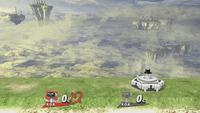
|
|---|
Taunts
- Up taunt: Faces the screen and then spins his head and torso in a circle.
- Side taunt: Faces the screen and sways his head around while emitting flashing sparkles from his eyes.
- Down taunt: Faces the screen and moves his torso down to his base before spinning it back up into place.
| Up taunt | Side taunt | Down taunt |
|---|---|---|
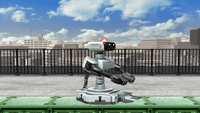
|
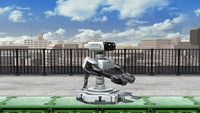
|
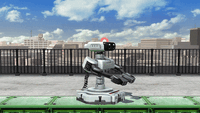
|
Idle poses
- Briefly looks toward the screen.
- Briefly nods off, then shakes his head and wakes up.
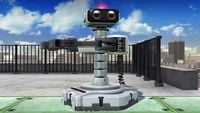 |
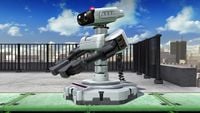
|
|---|
Crowd cheer
| English | Japanese | |
|---|---|---|
| Cheer | ||
| Description | R-O-B! | Ro-bot! |
| Pitch | Group chant | Group chant |
Victory poses
- Uses Robo Burner, spins and then lands, after which his torso lowers and slowly elevates back into place while spinning his head.
- Rears back his arms, then rotates them into an upward position while spinning his head, after which he performs a cheering gesture while continuing to spin his head.
- Sways his head around while emitting flashing sparkles from his eyes, then slightly adjusts his arms and torso. It is almost identical to his side taunt.
 |
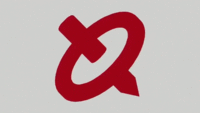 |
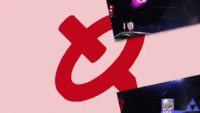
|
|---|
In competitive play
Official Custom Moveset Project
| Character | Custom sets available | ||||
|---|---|---|---|---|---|
| 1231 | 1233 | 1331 | 1333 | 1332 | |
| 2233 | 1131 | 1133 | 1221 | 1223 | |
Notable players
Active
8BitMan - One of the two best R.O.B. players in the world. Ranked 8th on the South Florida Power Rankings.
Ginko - Placed 3rd at Hyper Sumabato, 4th at KSB 2016, and 33rd at Umebura S.A.T.
Gyo - Ranked 10th on the Dallas Fort-Worth Power Rankings.
Holy - One of the best R.O.B. players in the world. Formerly ranked 4th on the Montreal Power Rankings.
Jams - Ranked 6th on the Alberta Power Rankings, best active R.O.B. in Canada.
LoNg0uw - The best R.O.B. player in Europe. Ranked 5th on the German Power Rankings.
Mister Eric - Ranked 4th on the Kentucky Power Rankings.
OCEAN - The best R.O.B. player in Japan.
Raffi-X - One of the best R.O.B. players in the world. Ranked 10th on the New England Power Rankings.
Robo~Luigi - Ranked 4th on the Spanish Power Rankings.
SaSSy - Ranked 2nd on the Austin Power Rankings. Has wins on CaptainZack and saj.
Sim-Max - Ranked 3rd on the Italian Power Rankings.
Virus - Formerly ranked 7th on the NorCal Power Rankings.
WaDi - The best Mewtwo player with a very strong R.O.B. secondary. One of the best R.O.B. players in the world. Ranked 1st on the MD/VA Power Rankings, and 22nd on the Panda Global Rankings v5.
WiiGi - Formerly ranked 15th on the SoCal Power Rankings.
Tier placement and history
Thanks to his potent zoning and grab games, R.O.B. was initially considered a high-tier character during SSB4's release, similarly to initial perceptions of him during the early days of Brawl's metagame. However, after update 1.0.6 nerfed his up throw's power, his reputation declined to the point that he was perceived as a mid-tier character. Nevertheless, R.O.B.'s representation in competitive play remains decent, while the good results he has achieved thanks to the likes of 8BitMan, Holy, Mister Eric, OCEAN and Raffi-X resulted in him being ranked 20th on the first tier list.
However, other characters like Donkey Kong, Lucario and, most notably, Toon Link, have achieved much better results than R.O.B. To further compound this, R.O.B. has become rarer in competitive play due to having unfavorable matchups against all but one of the DLC characters. This decline in popularity and results would end up with R.O.B. being ranked 28th on the second tier list, then to 33rd on the third tier list (this drop is notable for being the third highest between the second and third tier lists), and finally to 36th on the fourth and current tier list.
Trophies
- R.O.B.
Originally released in 1985 as a peripheral for the NES, R.O.B. was a little robot that responded to flashing lights in games. In this game, he can fire gyros and lasers at his enemies. He also has the ability to hover, which is handy for recoveries. Keep in mind that his Robo Beam can be charged up for an extra-powerful shot.
: Robotic Operating Buddy (10/1985)
: Mario Kart DS (11/2005)
- R.O.B. (Alt.)
R.O.B.'s side smash, S3, fires a laser beam that does more damage up close. You can also aim it slightly up or down before firing. His down special Gyro sends a spinning top hurtling forwards. While charging it up, you can move left or right to do a quick dodge, then continue charging where you left off!
: Robotic Operating Buddy (10/1985)
: Mario Kart DS (11/2005)
- Super Diffusion Beam
For R.O.B.'s Final Smash, he folds his arms down, transforms into an invincible cannon, and fires a huge beam that can be panned slowly up and down. The beam splits up partway through into smaller beams that drags foes to the center, where they'll be hit continuously. The assault finishes off with a single wide beam just for good measure.
For R.O.B.'s Final Smash, he folds his arms down, transforms into an invincible cannon, and fires a huge beam that can be aimed slowly up and down. The beam splits up partway through into smaller beams that drag foes to the centre, where they'll be hit continuously. The assault finishes off with a single wide beam, just for good measure.
In Event Matches
Solo Events
- All-Star Battle: Secret: R.O.B. is one of the opponents fought in this event. All opponents are unlockable characters in previous Super Smash Bros. games.
- Mechanical Menace: As Shulk, the player must defeat a metal R.O.B., a metal Mega Man and Metal Face in a Stamina Battle.
- Robotic Rampage: R.O.B. is allied with two R.O.B.s and must defeat a giant metal R.O.B.
Co-op Events
- Robots vs. Dragons: R.O.B. and Mega Man must defeat a giant Yoshi, a giant Charizard and Ridley in a Stamina Battle.
- The Ultimate Battle: Two players select a character and must defeat the entire roster.
Alternate costumes
R.O.B.'s default costume differs between the international and Japanese versions of SSB4. In the American and PAL region versions, his default costume consists of his Nintendo Entertainment System (NES) color scheme; in the Japanese version, his default costume consists of his Family Computer (Famicom) color scheme. This affects the color scheme of R.O.B.'s standard trophy, but not his appearances in the Sound Test for Super Smash Bros. for Nintendo 3DS or the Special Orders tickets for Super Smash Bros. for Wii U. His Final Smash trophy and Classic post-credits scenes in Super Smash Bros. for Wii U also use his Famicom color scheme.

| |||||||

|

|

|

|

|

|

|

|
Gallery
On Pilotwings.
Preparing to use his back aerial alongside Meta Knight and Donkey Kong.
Using his side taunt while metal and alongside Diddy Kong and Toon Link.
Preparing to use Super Diffusion Beam, his new Final Smash.
Using his down tilt on Rainbow Road.
Preparing to use Robo Burner alongside Olimar.
Trivia
- R.O.B.'s Boxing Ring English title in Ultimate and the American version of Smash 4, "The Last of His Kind", is a reference to the fact that R.O.B. is the only surviving member of his kind following the conclusion of Brawl's Adventure Mode: The Subspace Emissary.
- R.O.B. is the only character in the series to have different default costumes in different regional releases of the same game.
- Despite having different default costumes in different regions, the official website shows R.O.B.'s Famicom color scheme in official artwork, although half of the screenshots show his NES color scheme.
- Unlike in Brawl, R.O.B. can now be rendered helpless. This can only be done if he lands on Pac-Jump's trampoline while the trampoline is red.
- In the Wii U version of the game, since its release, R.O.B. cannot display emotion in the game's Smash mode, which is a visual glitch. However, he can properly emote in most other game modes, as well as on any mode in the 3DS version of the game.
- R.O.B.'s in-game portrait is the only one that does not briefly emit flashing sparkles when his chargeable attack (Gyro in his case) is fully charged.
- R.O.B.'s status as a video game peripheral is referenced in Palutena's Guidance to Pit regarding R.O.B., in which Pit suggests calling him "Mr. HVC-012". HVC-012 is R.O.B.'s Japanese product ID.[2]
References
| Fighters in Super Smash Bros. 4 | |
|---|---|
| Veterans | Bowser · Captain Falcon · Charizard · Diddy Kong · Donkey Kong · Dr. Mario · Falco · Fox · Ganondorf · Ike · Jigglypuff · King Dedede · Kirby · Link · Lucario · Lucas · Luigi · Mario · Marth · Meta Knight · Mewtwo · Mr. Game & Watch · Ness · Olimar · Peach · Pikachu · Pit · R.O.B. · Roy · Samus · Sheik · Sonic · Toon Link · Wario · Yoshi · Zelda · Zero Suit Samus |
| Newcomers | Bayonetta · Bowser Jr. · Cloud · Corrin · Dark Pit · Duck Hunt · Greninja · Little Mac · Lucina · Mega Man · Mii Fighter (Mii Brawler · Mii Gunner · Mii Swordfighter) · Pac-Man · Palutena · Robin · Rosalina & Luma · Ryu · Shulk · Villager · Wii Fit Trainer |
|
| |
|---|---|
| Fighter | R.O.B. (SSBB · SSB4 · SSBU) |
| Enemies | R.O.B. Squad (R.O.B. Blaster · R.O.B. Launcher · R.O.B. Sentry) |
| Other | Ancient Minister · Isle of the Ancients |
| Trophies, Stickers, and Spirits | Trophies (SSBB · SSB4) · Spirits |
| Music | Gyromite |
